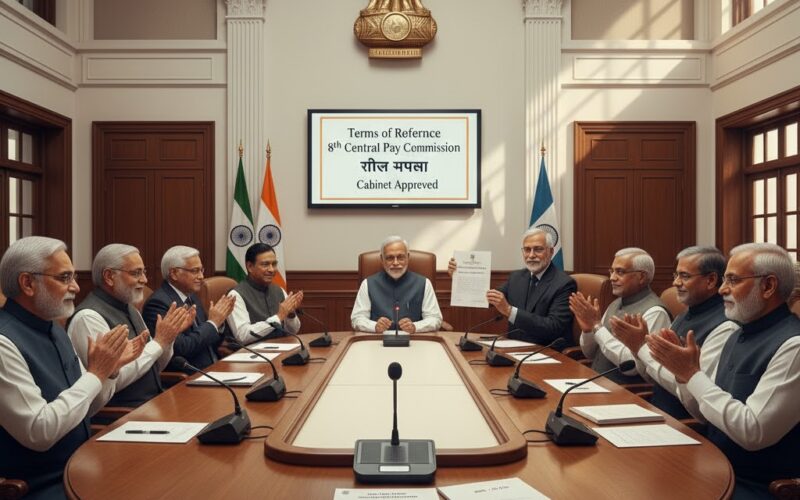#8thPayCommission #CentralGovernmentEmployees #UnionCabinet #ModiGovernment #GovernmentPolicy #EmployeeWelfare #PensionReforms #PublicSector #IndiaEconomy #FiscalPolicy #PayCommission2026 #GovernmentNews #PIBIndia #NationalUpdates #EconomicReforms
New Delhi: In a major decision impacting millions of Central Government employees and pensioners across the country, the Union Cabinet chaired by Prime Minister Shri Narendra Modi has officially approved the Terms of Reference (ToR) for the 8th Central Pay Commission (CPC). This announcement marks the beginning of a comprehensive review process of pay structures, allowances, pensions, and service conditions for central government employees, with its recommendations expected to take effect from January 1, 2026.
A Critical Move for Economic and Administrative Reforms
The 8th CPC, as approved by the Cabinet, will be a temporary commission comprising:
-
One Chairperson
-
One Part-Time Member
-
One Member-Secretary
The Commission has been tasked with submitting its comprehensive report within 18 months from the date of constitution. It may also provide interim reports on key matters as recommendations are finalized—allowing the government to implement critical reforms in a phased manner.
This development holds immense significance given that the Central Pay Commissions are traditionally formed every ten years to revise salaries and benefits in line with the evolving economic landscape, inflationary pressures, and changing cost of living.
Key Focus Areas of the 8th Pay Commission
While formulating its recommendations, the Commission will be guided by five major parameters:
-
Macroeconomic Conditions and Fiscal Responsibility
The Commission must ensure that its recommendations are financially sustainable and aligned with India’s long-term fiscal consolidation goals. This reflects the government’s intention to balance employee welfare with economic discipline. -
Allocation for Development and Social Welfare
A core consideration will be the need to protect funds for critical development schemes and welfare initiatives, underscoring the importance of inclusive growth. -
Rising Burden of Pensions
With non-contributory pension schemes constituting a significant recurring expenditure, especially after retirement age increases and longer life expectancy, the CPC will evaluate a balanced pension structure. -
Impact on State Finances
Historically, most state governments adopt central pay commission recommendations with modifications. The Commission must therefore assess the cascading financial impact on states to prevent fiscal stress. -
Comparison with Private Sector and CPSU Salaries
The Commission will also consider the existing compensation structures in the private sector and in central public sector undertakings to ensure parity, competitiveness, and retention of talent in government services.
Why Is the 8th Pay Commission Important?
The Central Pay Commission recommendations directly affect:
-
Nearly 50 lakh central government employees
-
Over 60 lakh pensioners
-
Employees of autonomous bodies and PSUs who often adopt CPC recommendations
-
State government employees indirectly, as many states follow similar pay structures
The 8th CPC is expected to address concerns regarding stagnation in salaries, erosion of real income due to inflation, and the rising cost of living. It is also likely to focus on performance-linked pay, digitization incentives, and rationalization of allowances to meet contemporary administrative needs.
Background and Historical Relevance
The tradition of Pay Commissions dates back to pre-independence India. Post-independence, the First CPC was constituted in 1946. Since then, Pay Commissions have brought transformative changes:
-
6th CPC introduced the concept of pay bands and grade pay.
-
7th CPC implemented the Fitment Factor and Pay Matrix system, eliminating grade pay and simplifying salary structures.
The Government announced the formation of the 8th CPC in January 2025, maintaining the decadal cycle of revisions. The timely approval of ToR lays the foundation for the next wave of financial reforms for public sector employees.
Employee Expectations and Economic Impact
Central government employees and pensioners have shown high anticipation for favorable recommendations, particularly in the areas of:
-
Higher fitment factor to boost basic pay
-
Revision of House Rent Allowance (HRA)
-
Increase in Dearness Allowance (DA) ceiling
-
Pension reforms to adjust for inflation
-
Measures to address pay discrepancies across cadres
Experts believe that while the implementation of CPC recommendations enhances the purchasing power of government employees—stimulating demand in housing, retail, and automobiles—it also increases fiscal expenditure. Therefore, the Commission faces the dual challenge of enhancing employee welfare while maintaining macroeconomic stability.
What Happens Next?
With the approval of the Terms of Reference, the Government will soon notify the official constitution of the Commission, after which consultations with employees’ unions, economic advisory bodies, and sector experts will commence.
The final report is expected by mid-2026, with implementation likely aligned with the financial cycle beginning January 1, 2026, as per the historical trend.
Conclusion
The Union Cabinet’s decision marks a pivotal step toward reshaping the financial architecture of India’s public service workforce. As the 8th Pay Commission embarks on this crucial task, its recommendations will not only redefine the salary and pension framework but also influence consumption patterns, fiscal policy, and economic growth in the coming decade.
Hashtags
#8thPayCommission #CentralGovernmentEmployees #UnionCabinet #ModiGovernment #GovernmentPolicy #EmployeeWelfare #PensionReforms #PublicSector #IndiaEconomy #FiscalPolicy #PayCommission2026 #GovernmentNews #PIBIndia #NationalUpdates #EconomicReforms

